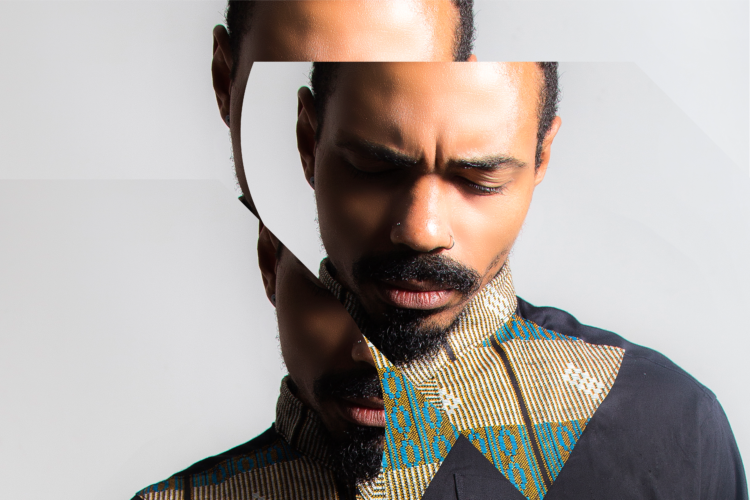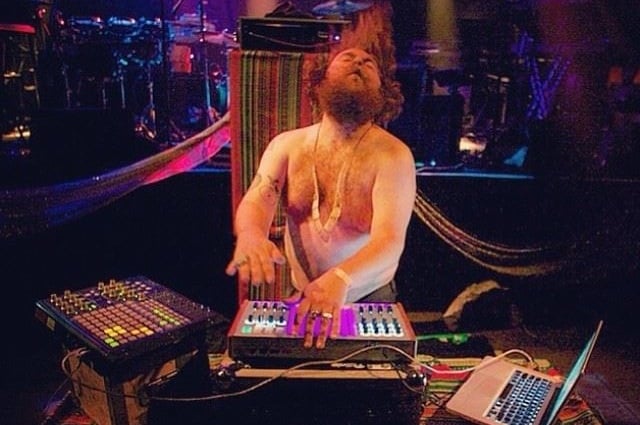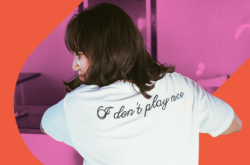This week, we’re excited to bring you the first installment of Community Spotlight, a series where we shed light on the unique musical journeys of individual Splice Community members.
We also discuss how they use Splice in their production process and what they hope the future holds for their music. In this article, we sat down with Diima to discuss his formative years, how he got into production, his favorite sample packs, and more.
This blog post mentions Splice Studio, which is no longer active. Learn more about the shutdown here.
Your bio on Splice says you’ve moved around a lot. Can you talk a bit about this journey and how it’s influenced your music making?
My full name is Dima Abubacar Dahaba. My artist name is “Diima.” I was born in Donetsk, Ukraine. My mother’s half Ukrainian and half Russian, and my father is Bissau-Guinean. I lived the earliest years of my life with my grandparents in Mariupol, Ukraine while my parents were studying in Moscow. Then, my family moved to Guinea-Bissau in the late 80s and we lived there until 1998, when a civil war forced us to refugee in a neighboring country – Senegal. It was tough times because the situation forced my family to split around the globe after a couple of months living in Senegal’s capital, Dakar. My father stayed in Guinea-Bissau to take care of our home during the war, my mother was living in Senegal working to provide for the family, and my sister and I were sent to back to our grandparents’ home in Ukraine so that we could finish college.
My father was mainly a fan of jazz and blues but he had an eclectic taste. So at the age of four I was already listening to 80s pop charts and all kinds of musical styles and genres from all over the world. When I was a teenager in Bissau, I had friends who formed musical groups and bands and I thought it was so cool seeing them performing, singing, and getting praised by the public. By that time I was only an observer who really liked music.
When the war ended two years later, we all returned to Guinea-Bissau. Shortly after, I applied to study computer science in Brazil and moved to Rio Grande do Sul in 2002. I ended up dropping the university because I was unhappy with the course and found out that this wasn’t my call. Then I tried publicity and marketing, which I also dropped after a year, but finally managed to graduate in music production at Anhembi Morumbi in São Paulo in 2009. When I look back, I think that I absorbed a little of every place I lived in and the connections I made throughout the years.
Wow, your story is absolutely extraordinary – thank you for sharing that with us. How did you go from being an observer of your peers to gaining interest in creating your own music and developing yourself as a serious producer / artist?
While I was in Ukraine, I got a Sony Playstation on my birthday from my grandma. Later on, I found out that she used the money my mother sent her in case of an emergency, and felt so bad for it that I asked why she did that. Her answer was, “Don’t worry, I have a good feeling about this. I’m sure I’m not throwing this money away.”
What she actually did was predict my career! After a couple of months fooling around with the system, I came across a program by Codemasters called Music, which allowed the user to manipulate loops on a 16-track sequencer. I was blown away by this technology (remember, it was 1999) and ditched all other games. It was day and night playing with Music, which introduced me to genres like drum & bass, jungle, and trip hop.
When I returned to Bissau after the war and started showing around my beats, everybody was impressed by the whole “sequencing-on-a-video-game-plugged-to-a-tv-and-HiFi-system” thing because they were used to making music in a more traditional and analogue way. Some friends then said, “Well, you sound good with these ‘dance’ tracks, but why don’t you try to do something that people like to listen to in Guinea-Bissau like our traditional music and hip hop and actually charge for that?”
This was the start of my change in mindset from ‘beatmaker for fun’ to producer and artist. I loved specific aspects and processes of music making so I knew I had a lot to learn to be taken seriously and make a living out of music, so I started self-teaching myself about producing, recording, sound engineering, songwriting, singing, and rapping. I was hanging around musicians all the time. I eventually formed a rap/R&B duo with a friend, but we split when I moved to Brazil. The next year, I formed another duo called Sevenlox (we’re still making music today).
Until last year, I was mainly working with my group and engineering and producing for other artists who were interested in my work. This year I decided to make a solo album. I released my first EP in 2015 just for the sake of releasing.

How has Splice had an impact on your production process or workflow?
Ok, this is going to be a biased answer because I’m such a fan now! Splice changed everything for me, from my workflow to the speed and quality of my music. It’s an instantaneous resource for inspiration. It took me a while to understand how to make it fit my musical needs. At first I was a bit skeptic signing up for Splice Sounds. But now I’m so happy I got past that limited thinking, because now a sea of possibilities has opened up in front of me. I went from skeptic to “man, this right here is gold, can’t let nobody know about that.” I think that’s so silly now.
Production-wise, before Splice I had that “super ultra secret stash” folder (my fellow producers will understand me on this) where I used to keep all the sampled stuff off the records, “bootlegged” sounds (I don’t need to do it anymore because of Splice), musical references, and voice memos. It was a way for me to never run out of creative ideas. Whenever I wanted to start a new beat or song, I’d go to that folder first. The beat making process could start with a drum pattern, chord progression, or just some weird sounds that I tweaked until I had something usable. Now, instead of checking that folder first, I go to Splice.
As for sample packs, man, there’s so many favorites that I don’t even know where to start. But let’s say I’m a huge fan of independent producer sample packs that are released under Splice’s own label. To name a few: Medasin, KRANE, KSHMR, Decap, SAKIMA, Graves… there are just too many! I consider these producers geniuses. Hands down.
In the plugins world you guys revolutionized once again, making it possible for a larger audience of producers to have access to professional tools on an affordable Rent-To-Own model. I got iZotope’s Ozone and Neutron Advanced this way. I can’t live without them anymore! Once learned how to use them properly, my life changed. Combined with Sounds, it sped up my mixing and production process by 70% or more. I’m also in love with Output’s Movement now for its endless sound design possibilities. I use a lot of Slate Digital plugins to color my sound (Virtual Mix Rack, Virtual Tape Machine, Virtual Bus Compressors), and of course the plugin OGs Waves (API 2500, Real Tune, Kramer Tape, J37).
Later on I came to understand that it doesn’t matter if everybody has access to the same packs and sounds – what matters the most and what’s going to set you apart is how you manipulate and combine these sounds, regardless of your genre or style. Splice Sounds also teaches a producer how to use tags and a search system to train our ears constantly. Every time I go through a sample pack listening to the sounds, I’m actually curating them in my head even before you hit that download or like button. So yes, mad respect on that.
Where do you think your music is headed next? Anything that you’d like to share with us?
Yes! As I said previously, I’m working on my debut album which is a mixture of genres ranging from Afropop to future hip hop, but my identity is the gluing factor on these tracks. It’s a slow process as I’m doing everything by myself, but I’m loving the process because I’m able to do it on my terms with the music that I like. I think that when you’re honest with your art and you really put in the work to make the best art you can with the tools and knowledge you have at your disposal, it’s hard to go unnoticed. I don’t know where this work is going to take me next but that’s the fun part. It’s a matter of being open to possibilities.
Did you collaborate from across the globe using Splice Studio? Has your EP come together with the help of Splice Sounds? Did Rent-to-Own allow you to access the tools you needed to level up your production? Email us at stories@splice.com – we want to tell your story.
July 23, 2018



